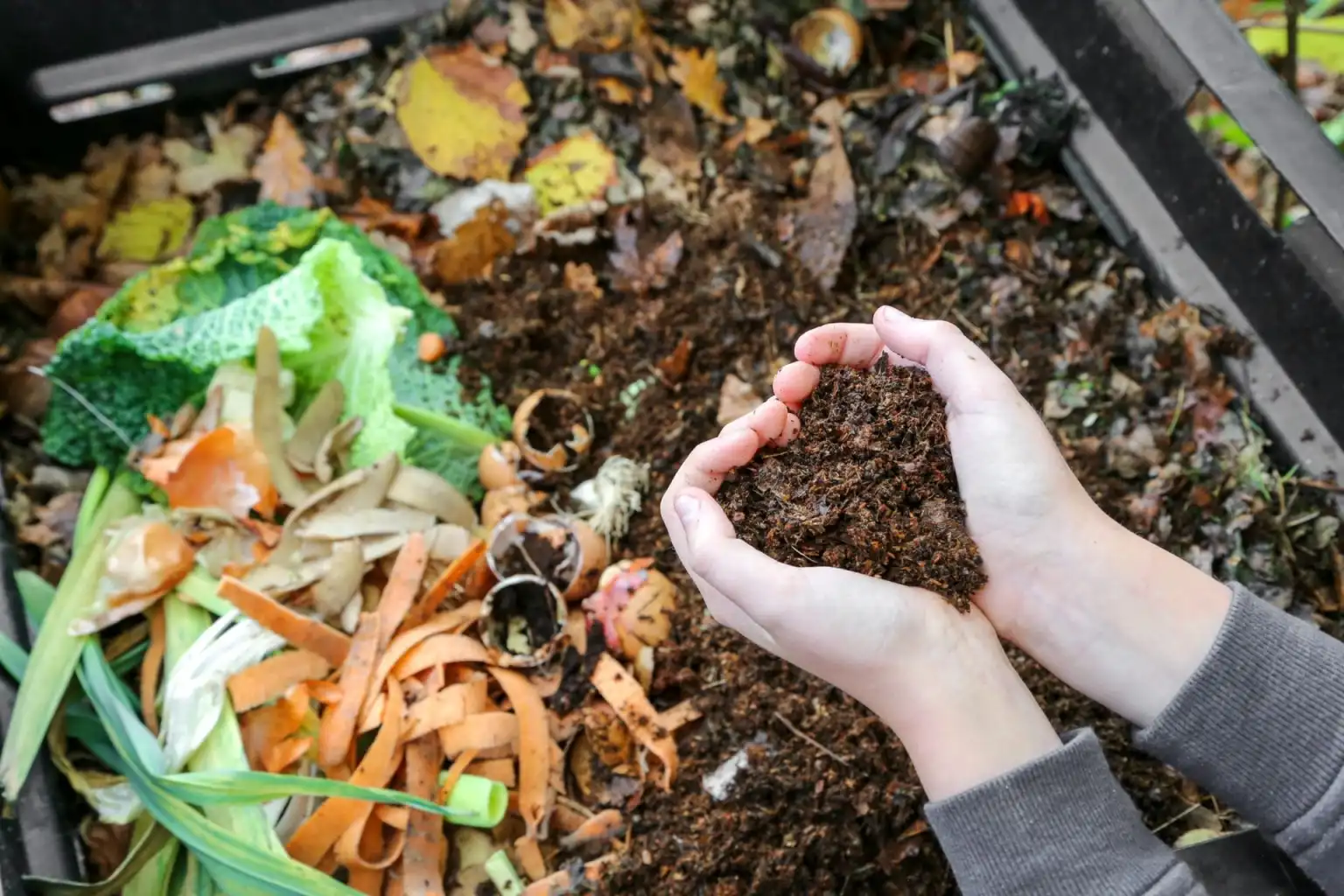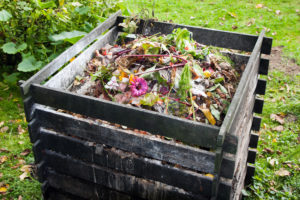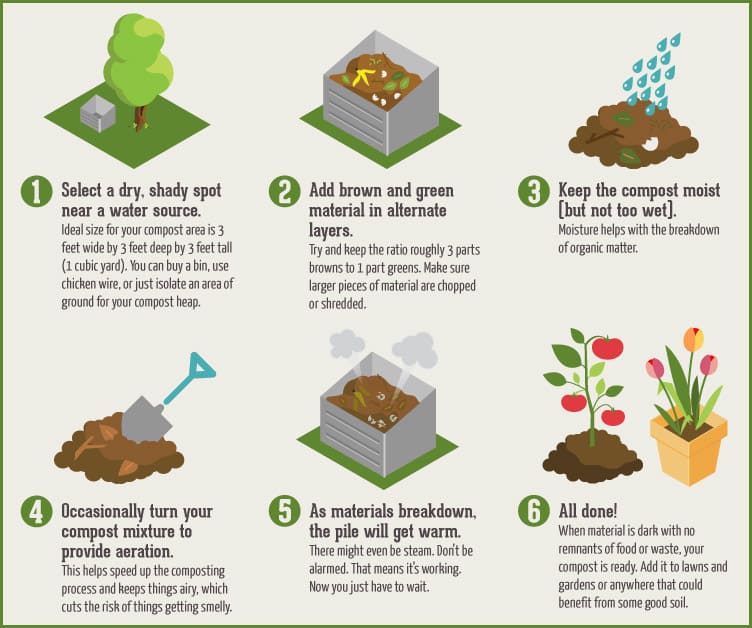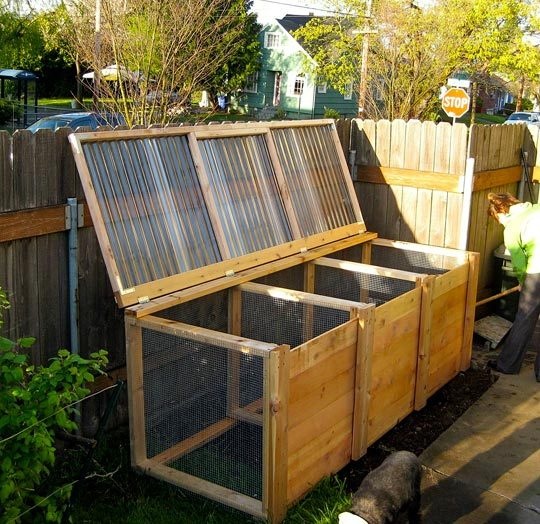
Written by s • Make Your Own Compost – Part 1
The word ‘organic’ has many meanings these days, and most people probably think of ‘food grown without chemicals’ when they hear it. An older meaning is, ‘made from something natural’, and that meaning certainly applies to what some gardener’s call, ‘black gold’ – the rich mixture of decomposed material that we add to our soil to give us stronger and better plants. The proper name, ‘Organic material’ is a broad term for anything from rotted animal manure to peat moss, but one excellent form is garden compost.
What is Compost?
The name, ‘compost’ describes what happens when you take garden and kitchen waste and allow it to rot down into a crumbly, dark-brown material that no longer looks like the items you started with. Those weeds, grass clippings, flowers and vegetable leaves are miraculously transformed into a coarse material that looks a bit like earth, or peat moss, but certainly doesn’t look like leaves or flowers. Because it’s made from waste material, it’s free, and reduces garbage collection too. Mixed into your soil when preparing a bed, planting a tree or shrub, or mulching around existing plants, compost adds nutrients, retains water and improves drainage. No matter what kind of soil you have, adding compost (or other kinds of organic material) will bring it closer to the magical ‘well-drained loam’ that the books tell us is the perfect growing medium for almost all plants. Instead of spending your money buying bags of manure, making your own compost is an endless supply or organic material – for free.
Where Does Compost Come From?
How does this miracle of transformation take place? Because of the actions of microscopic organisms, mostly bacteria and fungi. Not those nasty bacteria that make us sick, or the fungi that grows between our toes. No, these ones are harmless organisms that, in living their own lives, do something very useful. They take all the plants and animals that have died, and turn them back into their simpler chemical parts. Without them we would be wading through miles-thick piles of the dead from eons ago. These organisms are the original recyclers, keeping precious natural materials in circulation, making them available for future generations.
If we want to turn our garden and kitchen waste into ‘black gold’ for our gardens, we need to focus on these invisible servants, called ‘decomposers’. If we look after their needs, and make their lives comfortable, with all they need to thrive, they will reward us by giving us free organic material for our gardens – a pretty good deal.
The Basics of Making Compost
Because of the almost magical nature of this process, a lot of ‘false news’ and inaccurate ideas have grown up. It seems we need all sorts of magical potions, special products and fancy equipment, but this is not true. Our compost servants have simple needs, easily provided free or for very little, and making basic compost is so easy that anyone can succeed at it. Sure, there are some more technical methods, such a vermiculture, using particular types of worms, for example, but if you have a spare corner in your garden, you can make your own with very little effort. Let’s look at the basic requirements, and then in next week’s blog we will look at practical ways to achieve them in your own garden.
Warmth, Food, Oxygen and Water
Since these bacteria and fungi are living things, they like the same things as we do – a warm place to be, oxygen-rich air, something to eat, and a drink. If your compost is cold, not much will happen. If it gets dry – ditto. Once some vital part of the diet of these little guys is used up, they stop growing and working. Let’s look in more detail at these requirements.
Warmth
The ideal temperature range for a compost pile is between 90 and 140 degrees Fahrenheit. Below that and not much will happen, above that and most organisms will die, leaving behind a nasty, smelly mess. No, we don’t need to add heaters, because when the decomposers get busy, they give out heat – like we do at the gym. So the temperature inside your compost pile is the result of the heat they give out, minus the heat being lost. Like lying under a thick blanket, inside a larger heap the temperature remains comfortable, even when it is cold outside. A small heap will cool down quickly, and probably only work well during the summer months. On the other hand, if you have a lot of rapidly decomposing material in your pile, such as grass clippings, it may heat too rapidly, and you will need to mix it up and open it a bit to let out the excess heat.
Food
Decomposers can handle most organic material, but how long it takes them can vary a lot. Fresh soft green materials, like young weeds or grass clippings are eagerly consumed in a short time. Coarse, woody materials, like tree trimmings, or thick vegetable stems, take longer. What makes the difference is how much nitrogen is in the material, compared to how much carbon.
Compost experts call this the C:N ratio. The idea C:N ratio is between 25 and 30 to 1. Grass clipping has a ratio of about 17:1 – 17 atoms of carbon to each atom of nitrogen. Vegetable waste from the kitchen is about 25:1, and fresh garden waste, like green leaves, dying flowers, and young weeds, have a ratio of 30:1. All these materials rot quickly. Fall leaves have a ratio of about 70:1, and woody branches about 700:1. You can see that those materials will only rot very slowly, or hardly at all. When we talk about the practical aspects of making compost next week, we will see how to deal with that.
Oxygen
Most decomposers are like us – they use oxygen to live, and give out carbon dioxide. If there is not enough air in your compost pile, they will die, and be replaced by nasty anaerobic bacteria – ones that don’t need oxygen. They will make your heap smelly and slimy, and not produce good compost for you. You need to build your pile in such a way that air flows into it, or turn it over regularly to get the same effect. More on this next time.
Water
Decomposers need moisture, not too much and not too little. In hot weather your heap may dry out, and in rainy weather it could get too wet. You will need to manage it properly to avoid these extremes, and keep it just right.
Other Things Decomposers Like
As well as these basics, there are some other conditions that help keep your compost pile working away happily. The most important one, and one that you can control, is how acidic the pile becomes. As organic material breaks down, acids are released. These make the pile more acidic – it develops a low pH value, perhaps 4.0 or less. The decomposers are not happy with this, so they slow down, and your heap will break down more slowly. To avoid this, we can raise the pH value in natural ways, which again will a practical matter for next time.
Now We Have the Basics
Now that we understand the basic ‘rules’ for making good compost, we will look next week at some practical ways of building compost piles, and taking care of them, so that our little decomposer organisms are kept happy, and they keep on turning your garden and kitchen waste into ‘black gold’ to enrich your garden soil – making your plants healthy and happy too.








